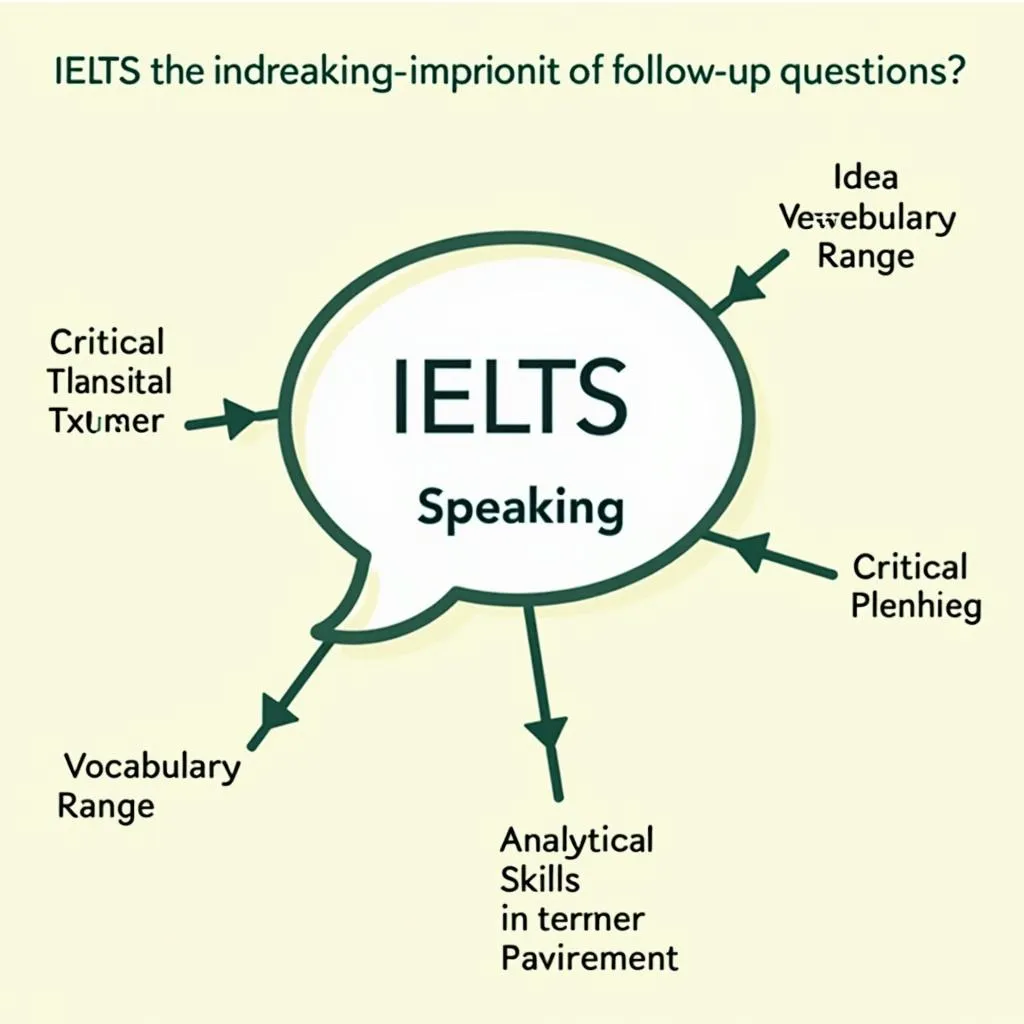Understanding the Importance of Follow-up Questions in IELTS Speaking
Follow-up questions play a crucial role in the IELTS Speaking test, particularly in Part 3. These questions allow examiners to delve deeper into your thoughts and assess your ability to express complex ideas fluently. Mastering the art of answering follow-up questions can significantly boost your speaking score and demonstrate your language proficiency.
Why Follow-up Questions Matter
- They test your ability to think on your feet
- They assess your vocabulary range and grammatical accuracy
- They evaluate your capacity to develop and expand on ideas
- They provide opportunities to showcase your analytical skills

Common Types of Follow-up Questions
Understanding the various types of follow-up questions can help you prepare more effectively. Here are some common categories:
1. Asking for Examples
Examiners often request specific examples to support your statements. For instance:
- Initial question: “Do you think technology has improved communication?”
- Follow-up: “Can you give me an example of how technology has enhanced communication in your daily life?”
2. Probing for Reasons
These questions ask you to explain the rationale behind your opinions:
- Initial question: “Do you prefer reading books or watching movies?”
- Follow-up: “Why do you think some people prefer books over movies?”
3. Exploring Consequences
Examiners may ask about the potential outcomes or impacts of a situation:
- Initial question: “Should governments invest more in renewable energy?”
- Follow-up: “What might be the long-term effects of not investing in renewable energy sources?”
4. Comparing and Contrasting
These questions require you to analyze similarities and differences:
- Initial question: “How has education changed in your country over the last decade?”
- Follow-up: “How does the education system in your country compare to that of other countries?”
Strategies for Answering Follow-up Questions Effectively
To excel in handling follow-up questions, consider implementing these strategies:
1. Active Listening
Pay close attention to the examiner’s questions. This will help you:
- Understand the specific focus of the follow-up question
- Identify key words that guide your response
- Avoid misinterpreting the question
2. Structuring Your Response
Organize your thoughts quickly and present them coherently:
- Use linking words to connect ideas (e.g., “However,” “Moreover,” “On the other hand”)
- Start with a clear statement that directly addresses the question
- Support your main point with reasons, examples, or explanations
3. Expanding Your Answer
Demonstrate your language skills by elaborating on your initial response:
- Provide personal experiences or observations
- Discuss broader implications or related topics
- Offer balanced viewpoints if appropriate
4. Using Advanced Vocabulary and Grammar
Showcase your language proficiency:
- Incorporate idiomatic expressions naturally
- Use a variety of sentence structures (e.g., conditional sentences, relative clauses)
- Employ topic-specific vocabulary to demonstrate your knowledge
5. Maintaining Fluency
Keep your speech smooth and natural:
- Use fillers sparingly to avoid long pauses (e.g., “Well,” “Let me think…”)
- Practice speaking at a steady pace
- If you need time to think, rephrase part of the question to buy yourself a moment
Common Pitfalls to Avoid
Be aware of these common mistakes when answering follow-up questions:
- Repeating the same information from your initial answer
- Providing overly brief responses that lack depth
- Straying off-topic or failing to address the specific question asked
- Using memorized answers that don’t fit the context of the follow-up question
- Speaking too quickly or too slowly, which can affect your fluency score
Practice Exercises for Follow-up Questions
To improve your skills in handling follow-up questions, try these exercises:
-
Topic Expansion: Choose a simple topic (e.g., “hobbies”) and practice expanding on it for 2-3 minutes, imagining potential follow-up questions.
-
Mock Interviews: Ask a friend or language partner to role-play as an IELTS examiner, focusing on asking follow-up questions.
-
News Article Analysis: Read a news article and practice formulating and answering potential follow-up questions based on the content.
-
Record and Review: Record yourself answering practice questions and listen back to identify areas for improvement in your responses.
-
Timed Responses: Set a timer for 30 seconds and practice giving concise, well-structured answers to random follow-up questions.
Conclusion
Mastering IELTS Speaking follow-up question techniques is essential for achieving a high score in the speaking test. By understanding the types of questions you may encounter, implementing effective answering strategies, and practicing regularly, you can significantly enhance your performance. Remember, the key is to demonstrate your ability to think critically, express ideas clearly, and showcase your English language skills confidently. Keep practicing, stay focused, and approach follow-up questions as opportunities to shine in your IELTS Speaking test.